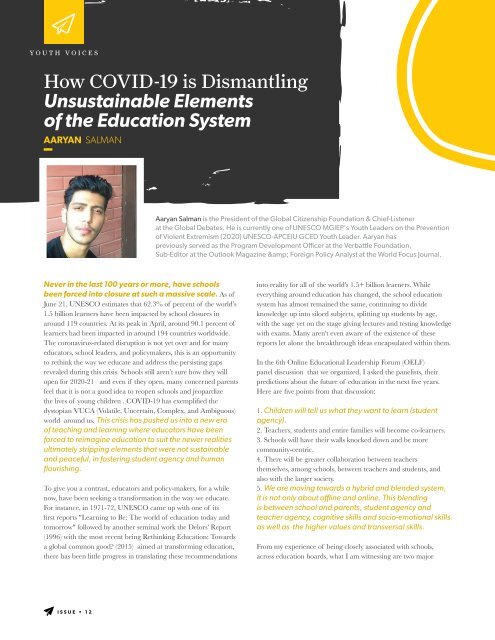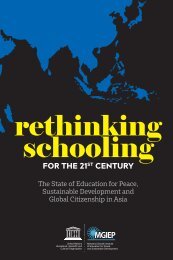The Blue DOT - 12: Reimagining Learning Spaces for Uncertain Times
You also want an ePaper? Increase the reach of your titles
YUMPU automatically turns print PDFs into web optimized ePapers that Google loves.
YOUTH VOICES<br />
How COVID-19 is Dismantling<br />
Unsustainable Elements<br />
of the Education System<br />
AARYAN SALMAN<br />
Never in the last 100 years or more, have schools<br />
been <strong>for</strong>ced into closure at such a massive scale. As of<br />
June 21, UNESCO estimates that 62.3% of percent of the world’s<br />
1.5 billion learners have been impacted by school closures in<br />
around 119 countries. At its peak in April, around 90.1 percent of<br />
learners had been impacted in around 194 countries worldwide.<br />
<strong>The</strong> coronavirus-related disruption is not yet over and <strong>for</strong> many<br />
educators, school leaders, and policymakers, this is an opportunity<br />
to rethink the way we educate and address the persisting gaps<br />
revealed during this crisis. Schools still aren’t sure how they will<br />
open <strong>for</strong> 2020-21 and even if they open, many concerned parents<br />
feel that it is not a good idea to reopen schools and jeopardize<br />
<br />
dystopian VUCA (Volatile, <strong>Uncertain</strong>, Complex, and Ambiguous)<br />
world around us. This crisis has pushed us into a new era<br />
of teaching and learning where educators have been<br />
<strong>for</strong>ced to reimagine education to suit the newer realities<br />
ultimately stripping elements that were not sustainable<br />
and peaceful, in fostering student agency and human<br />
flourishing.<br />
To give you a contrast, educators and policy-makers, <strong>for</strong> a while<br />
now, have been seeking a trans<strong>for</strong>mation in the way we educate.<br />
For instance, in 1971-72, UNESCO came up with one of its<br />
<br />
tomorrow" followed by another seminal work the Delors' Report<br />
(1996) with the most recent being Rethinking Education: Towards<br />
a global common good? (2015) aimed at trans<strong>for</strong>ming education,<br />
there has been little progress in translating these recommendations<br />
Aaryan Salman is the President of the Global Citizenship Foundation & Chief-Listener<br />
at the Global Debates. He is currently one of UNESCO MGIEP's Youth Leaders on the Prevention<br />
of Violent Extremism (2020) UNESCO-APCEIU GCED Youth Leader. Aaryan has<br />
previously served as the Program Development Officer at the Verbattle Foundation,<br />
Sub-Editor at the Outlook Magazine & Foreign Policy Analyst at the World Focus Journal.<br />
into reality <strong>for</strong> all of the world's 1.5+ billion learners. While<br />
everything around education has changed, the school education<br />
system has almost remained the same, continuing to divide<br />
knowledge up into siloed subjects, splitting up students by age,<br />
with the sage yet on the stage giving lectures and testing knowledge<br />
with exams. Many aren't even aware of the existence of these<br />
reports let alone the breakthrough ideas encapsulated within them.<br />
In the 6th Online Educational Leadership Forum (OELF)<br />
panel discussion that we organized, I asked the panelists, their<br />
<br />
<br />
1. Children will tell us what they want to learn (student<br />
agency).<br />
2. Teachers, students and entire families will become co-learners.<br />
3. Schools will have their walls knocked down and be more<br />
community-centric.<br />
4. <strong>The</strong>re will be greater collaboration between teachers<br />
themselves, among schools, between teachers and students, and<br />
also with the larger society.<br />
5. We are moving towards a hybrid and blended system,<br />
It is not only about offline and online. This blending<br />
is between school and parents, student agency and<br />
teacher agency, cognitive skills and socio-emotional skills<br />
as well as the higher values and transversal skills.<br />
From my experience of being closely associated with schools,<br />
across education boards, what I am witnessing are two major<br />
This crisis has pushed us into a<br />
new era of teaching and learning<br />
where educators have been <strong>for</strong>ced<br />
to reimagine education to suit the<br />
newer realities ultimately stripping<br />
elements that were not sustainable<br />
and peaceful, in fostering student<br />
agency and human flourishing.<br />
<br />
initial, survival phase (lasting initial four to six weeks of trial and<br />
error in the lockdown), where even those schools that had some<br />
level of online teaching be<strong>for</strong>e the pandemic, tried to translate<br />
their physical school into an online school with a similar daily<br />
schedule and number of classes. Realizing the unsustainability and<br />
incompatibility of pre-existing pedagogical approaches to the new<br />
medium, educators had to shift their focus from online schooling<br />
to online "learning". <strong>The</strong> outcomes of these innovations in<br />
pedagogical approaches and content delivery is a shift in the way<br />
they engage with learners.<br />
<br />
long hours of online sessions were cut short by employing<br />
<br />
REFERENCES<br />
1) https://en.unesco.org/covid19/educationresponse<br />
2) https://www.washingtonpost.com/education/2020/06/18/its-<br />
mid-june-schools-still-arent-sure-how-they-will-open-2020-21-heres-<br />
why-whats-likely-happen/<br />
<br />
oppose-modi-govt-suggestion-to-reopen-schools-from-july/433182/<br />
5) https://en.unesco.org/futuresofeducation/initiative<br />
pedagogies, etc. Schools have started paying closer attention to<br />
fostering socio-emotional skills and resilience amongst faculty<br />
and learners. In some schools this has also translated into<br />
students gaining more voice and choice in the learning.<br />
Another domain that has been a gray area in the context of<br />
rethinking education is assessments. With online teaching and<br />
learning being a new phenomenon, another challenge schools<br />
have been facing is in ensuring that online assessments are both<br />
<br />
remote or online learning, educators are exploring the ways<br />
and means of embedding assessments in learning as opposed<br />
to assessments after learning in addition to ensuring that they<br />
are adaptive, responsive, and real-time in feedback. This in all<br />
probability will replace 'assessment of learning' with 'assessment<br />
<strong>for</strong> learning', moving education more towards a genuine learnercentered<br />
competency-based learning.<br />
<strong>The</strong>se changes, although involuntary and <strong>for</strong>ced, have been<br />
dismantling the unsustainable elements of the education system,<br />
and bringing to life the very ideas that UNESCO and others<br />
seeking 're<strong>for</strong>m' have been demanding. With the tinkering and<br />
changes happening today, educators now have a stronger space<br />
to naturally foster in learners and young people the four pillars of<br />
<br />
know, learning to live together and help shape global educational<br />
priorities <strong>for</strong> the future. However, the caveat is that, if<br />
schools are making these changes hoping that they'd<br />
be temporary, we may instead end up with more stifling<br />
and unsustainable elements within the education system.<br />
What we have is a new reality that has opened our eyes to the<br />
chinks in the education armory. Going back to the pre-pandemic<br />
'normal' education is neither sustainable nor in the interest of<br />
Generation Z, Alpha and beyond. <br />
6) https://www.globalcitizenshipfoundation.org/oelf/PD_202006061<br />
7) https://learnlife.s3.eu-central-1.amazonaws.com/<br />
ReLearn/%5BRE%5DLEARN_Takeaways_Will+Richardson.<br />
pdf ?utm_campaign=Online%20Forum%20April%202020&utm_<br />
4) https://www.we<strong>for</strong>um.org/agenda/2020/03/6-ways-to-thrive-inan-out-of-control-world/<br />
source=hs_email&utm_medium=email&_hsenc=p2ANqtz--_VJL-<br />
8zBjnYjs_6OcLshoxU06m7zQhi8uKTiNNA1vr5x8Zt2AAmf00FYg<br />
aX26EtRH35r<br />
8) https://crossworks.holycross.edu/cgi/viewcontent.<br />
cgi?article=1<strong>12</strong>9&context=necj<br />
YOUTH VOICES<br />
ISSUE • <strong>12</strong><br />
6 5


















